Related Research Articles

Chester William Nimitz was a fleet admiral in the United States Navy. He played a major role in the naval history of World War II as Commander in Chief, US Pacific Fleet, and Commander in Chief, Pacific Ocean Areas, commanding Allied air, land, and sea forces during World War II.

Samuel Taliaferro Rayburn was an American politician who served as the 43rd speaker of the United States House of Representatives. He was a three-time House speaker, former House majority leader, two-time House minority leader, and a 24-term congressman, representing Texas's 4th congressional district as a Democrat from 1913 to 1961. He holds the record for the longest tenure as Speaker of the United States House of Representatives, serving for over 17 years.
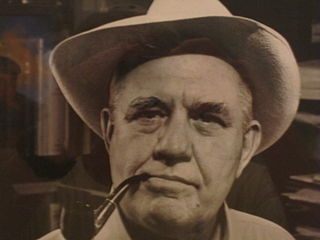
James Frank Dobie was an American folklorist, writer, and newspaper columnist best known for his many books depicting the richness and traditions of life in rural Texas during the days of the open range. As a public figure, he was known in his lifetime for his outspoken liberal views against Texas state politics, and carried out a long, personal war against what he saw as braggart Texans, religious prejudice, restraints on individual liberty, and the mechanized world's assault on the human spirit. He was instrumental in saving the Texas Longhorn breed of cattle from extinction.
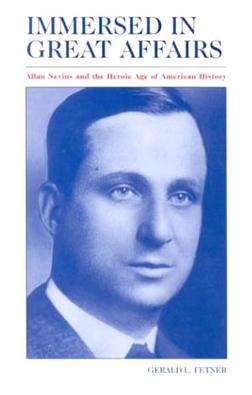
Joseph Allan Nevins was an American historian and journalist, known for his extensive work on the history of the Civil War and his biographies of such figures as Grover Cleveland, Hamilton Fish, Henry Ford, and John D. Rockefeller, as well as his public service. He was a leading exponent of business history and oral history.
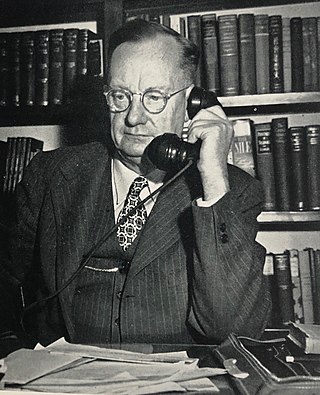
Emory Stephen Bogardus was a prominent figure in the history of American sociology. Bogardus founded one of the first sociology departments at an American university, at the University of Southern California in 1915.

The Social Science Research Council (SSRC) is a US-based, independent, international nonprofit organization dedicated to advancing research in the social sciences and related disciplines. Established in Manhattan in 1923, it today maintains a headquarters in Brooklyn Heights with a staff of approximately 70, and small regional offices in other parts of the world.

Hans Michael Mark was a German-born American government official who served as Secretary of the Air Force and as a Deputy Administrator of NASA. He was an expert and consultant in aerospace design and national defense policy.
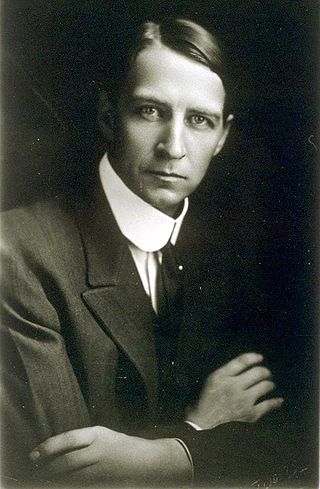
Herbert Eugene Bolton was an American historian who pioneered the study of the Spanish-American borderlands and was a prominent authority on Spanish American history. He originated what became known as the Bolton Theory of the history of the Americas which holds that it is impossible to study the history of the United States in isolation from the histories of other American nations, and wrote or co-authored ninety-four works. A student of Frederick Jackson Turner, Bolton disagreed with his mentor's Frontier theory and argued that the history of the Americas is best understood by taking a holistic view and trying to understand the ways in which the different colonial and precolonial contexts have interacted to produce the modern United States. The height of his career was spent at the University of California, Berkeley where he served as chair of the history department for twenty-two years and is widely credited with making the renowned Bancroft Library the preeminent research center it is today.
Henry Nash Smith was a scholar of American culture and literature. He was co-founder of the academic discipline "American studies". He was also a noted Mark Twain scholar, and the curator of the Mark Twain Papers. The Handbook of Texas reported that an uncle encouraged Smith to read at an early age, and that the boy developed an interest in the works of Rudyard Kipling, Robert L. Stevenson and Mark Twain.

Jerry Don Thompson is Regents Professor of History at Texas A&M International University in Laredo, Texas. He is a prolific author of books on a variety of related topics, specializing in the American Civil War, the history of the Southwestern United States, and Texas history. According to WorldCat, two of his books are available from more than six hundred major libraries worldwide – Confederate General of the West: Henry Hopkins Sibley, and Civil War in the Southwest: Recollections of the Sibley Brigade.
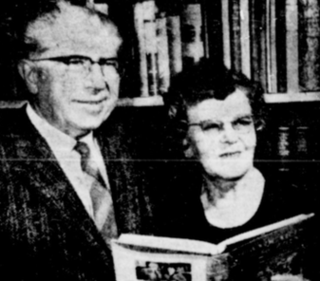
LeRoy Reuben Hafen was a historian of the American West and a Latter-day Saint. For many years he was a professor of history at Brigham Young University (BYU).
Joe Ben Wheat (1916–1997) was an American archaeologist, curator, teacher, and author known for his expertise on blanket weavings and textiles of the Navajo and other Indians in Arizona, New Mexico, and Colorado. His research focused on Mogollon, Anasazi, Great Plains Paleo-Indian, and African Paleolithic archaeology.
Robert Fleming Heizer was an archaeologist who conducted extensive fieldwork and reporting in California, the Southwestern United States, and the Great Basin.
Steven G. Kellman is an American critic and academic, best known for his books Redemption:The Life of Henry Roth (2005) and The Translingual Imagination (2000).
David Joseph Weber was an American historian whose research focused on the history of the Southwestern U.S. and its transition from Spanish and Mexican control to becoming part of the United States. For a period of time, this field of study had largely been ignored, as both United States and Latin American historians concentrated on the central stories in their fields. He "was among the first scholars to focus on the importance of the relationship between Mexico and the United States."

Harry Bolton Seed was an educator, scholar, former professor at the University of California, Berkeley. He was regarded as the founding father of geotechnical earthquake engineering.
Robert Burnett Hall, born in Española, New Mexico, was an American geographer known for his work on Japan. He taught for most of his career at University of Michigan, Ann Arbor.
Walter Rundell Jr. was an American author, archivist and historian who was distinguished in the field of Western American history.
Thomas Perkins Abernethy was an American historian and academic. He served as a professor of early American history at a number of universities throughout the South and Southwest United States. He mainly taught early American colonial history that concentrated on southern states, their notable figures, frontier life, the move westward, and how it impacted the social, economic and political fabric of colonial America and its transition into an independent nation.
Kent Worcester is an American political scientist, historian, and songwriter. His work deals with popular culture, intellectual history, trade unions, and social democracy. He has written extensively on comics and graphic novels and wrote a biography of C.L.R. James, the West Indian intellectual, among many other publications.
References
- ↑ Texas Archival Resources Online bio of Worcester
- ↑ The Journal of American History, Vol. 99, p. 287
- ↑ Daniel S. Burt, The Biography Book: A Reader's Guide to Nonfiction, Fictional, and Film Biographies of the 500 Most Fascinating Individuals of All Time (Greenwood Publishing Group, 2001) p. 36